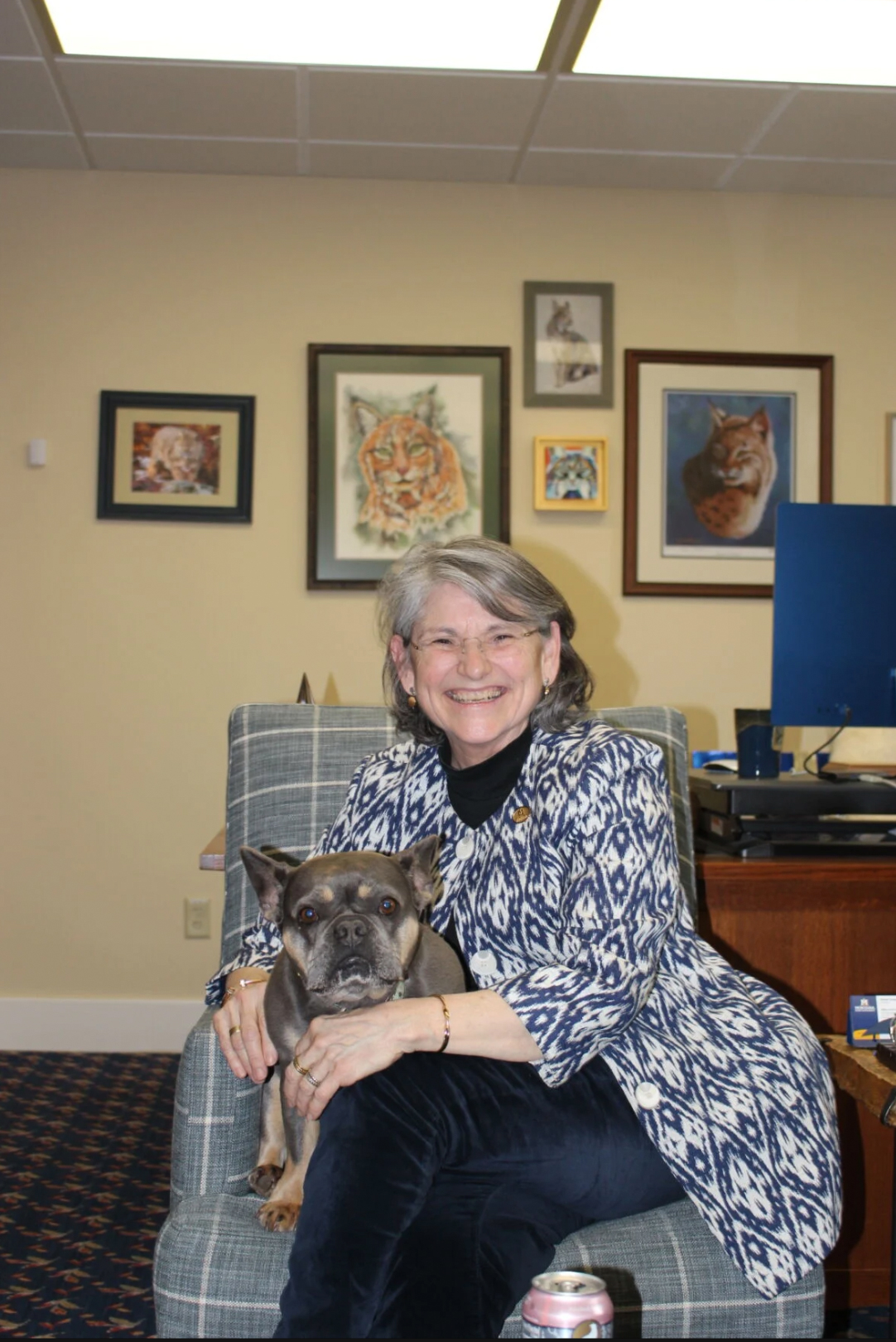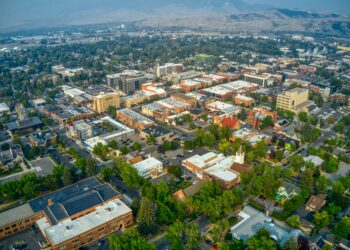By Amanda Fulton MSU EXPONENT
On the second floor of Montana Hall, there is an office with shelves and shelves of memories. Footballs, honorary plaques and awards, paintings, stickers, pottery sets, belt buckles and even an empty container of Wilcoxson’s “Bobcat Batter” ice cream. Dozens of framed photos and books sit among plush bobcats perched on the edges of the shelves, overlooking the heart of this University and the woman who occupies it — President Waded Cruzado.
On April 1, the Exponent sat down with MSU’s 12th president to speak about her upcoming retirement. “The year has been bittersweet. What can I say?” Cruzado said. “It’s been full of good, beautiful memories. Sometimes — I will confess — the memories have been overwhelming, and so I’ve been crying a lot too. At the same time, it’s been business as usual. The world doesn’t stop because the president is retiring.”
Cruzado explained that her last year on campus has been full of making memories and appreciating traditions, both old and new. “I think one of the beautiful things about life in a university is that it mimics nature in that it’s cyclical, and those seasons and those patterns repeat themselves. There’s beauty in that cadence — in the start of every semester, in finishing it up at the commencement ceremony,” she said, explaining that, along the way, MSU has been able to establish many new traditions and opportunities. “I have been trying to make sure that I don’t miss any of those opportunities, because those are the memories that I’m going to be taking with me.”

“I’m graduating, finally, after 15 years,” she joked.
Cruzado took office as MSU’s president in January 2010, becoming the first woman and the first minority to serve as a university president in Montana, according to MSU’s website. She was born in Mayagüez, Puerto Rico as the oldest of four children. Her grandmother taught her to read at age three, and she attended private school before pursuing higher education.
As the first person in her family to go to college, she graduated from the University of Puerto Rico in 1982 before earning her master’s and doctorate from the University of Texas. Cruzado then served as the dean of the College of Arts and Sciences at the University of Puerto Rico. Later, she became the executive vice president and then interim president of New Mexico State University before accepting the job as MSU’s president.
“One of the beauties of this job is I can look at you and tell you: Every day, I have learned something new,” Cruzado told us. “That’s why the job is so appealing and so challenging at the same time. I think the biggest satisfaction has been to have an opportunity to lean in and to learn from as many people as I can and to devote a listening ear. Truly, truly trying to understand people.”
Cruzado explained that when she first arrived at MSU, her goal was to immerse herself not only in the University but also in the state of Montana. To accomplish this, she held dozens of listening and learning sessions on campus and around the state to gain more knowledge on the ethos of the place.
“I learned, for example, that people in the state expected us to work very hard and to advance the University,” Cruzado explained. “For Montanans, there are no impossibles — you just pull yourself [up] by the bootstraps, shut up and get the job done. I said: Okay, I get it. That’s what we’re going to do.”
Cruzado also reflected fondly on one of her favorite traditions that helped her familiarize herself with Montana: the presidential bus tour, a 10-year program that she instituted during her second summer at MSU. “We rented this 50-passenger gigantic bus and we [filled] it with vice presidents and deans and faculty members, faculty leaders, student leaders, alumni — and off we went to different places in the state,” she said.
According to Cruzado, each annual tour was intended to observe the movers and shakers of Montana’s economy, such as beef, wheat, energy, art and history — and after 10 years, the tour had touched every corner of Montana. “I know people in all 56 counties in the state,” she said. “Those conversations, those face-to-face opportunities, that gesture of leaving Bozeman behind and connecting to the constituents that make this University happen — that surpassed any goal.”
She described how her experiences with the bus tour created other possibilities and ideas later on. “Things started to happen, from having a conversation with Jake Jabs — the real Jake Jabs — to having another conversation with the real Norm Asbjornson, to learning about this incredible man by the name of Maurice Hilleman. What do you mean that the man who invented all these vaccines is a graduate of [MSU], and how many other Maurice Hillemans could be out there? And that was the germ that gave us the Hilleman Scholars [Program],” Cruzado said.
In between witticisms and thoughtful reflection, she shared a few moments of the past year that were particularly special for her. An especially unforgettable one was last semester’s Cat-Griz football game, when the Spirit of the West marching band performed a surprise rendition of “Preciosa” — which Cruzado described as the second national anthem for Puerto Ricans — to honor her.
“I will remember that till the day I die. I am absolutely convinced,” she said. “And along the way, there have been so many other special moments and tributes. People have made me feel very special.”
After she retires from MSU in June, Cruzado will head to Washington, D.C., to assume leadership of the Association of Public and Land-Grant Universities (APLU). The APLU is an association of university leaders focused on research, advocacy and policy-making to help advance the mission of public research universities and land-grant institutions, according to its website.
“It appeared to me that I have been talking so much about the importance of public higher education [and] the history of land grants that if I am called to serve, I should do that and see if there are opportunities to contribute at a national level,” she said. “I’m excited. And I’m [also] like, what was I thinking? So, both at the same time.”
A land-grant university is an institution that has been designated by its state legislature or Congress to receive the benefits of the 1862 and 1890 Morrill Acts, according to the MSU website. The original land-grant mission was to provide the working class with the opportunity to receive an education.
Regarding her successor, Brock Tessman, Cruzado said that her best advice is to get out of the office and meet people. She explained that the best ideas are found through listening, building trust and having conversations.
“Finally, I will say: enjoy. Enjoy it, because it’s a beautiful job. It takes every ounce of your energy. It consumes every waking hour, but you have a unique opportunity to meet extraordinary people. I will say this: We have amazing alumni at [MSU]. We have the best faculty in the whole wide world,” she said. “We have the most dedicated staff, and the most important thing: we have the most extraordinary students.”
At the end of our time together, we asked Cruzado what her favorite thing about MSU was. “Other than beating the Griz?” she clarified with a smile. “Let me start with my most favorite thing because I think it’s emblematic of the rest, and that’s commencement.”
She explained that it has never grown old to walk into the Brick Breeden Fieldhouse and see it packed with 8,000 happy people. “That seldom happens in life, right? And when I look around and when I see the cowboy hats, the cowboy boots, when I see people, multigenerational folks so happy, because for many of those families, this will be the first person in their family to graduate from college — or sometimes it’s the third or the fourth Bobcat. To me, that is the fulfillment of our promise,” she said.
“We invited you to come [to MSU], and during those four or five years, you worked hard. There were times where you second-guessed your decision, but you persevered, and now the person that’s about to cross that stage is not the person that was admitted here,” Cruzado said. “Because now you’re part of this community, and that means something. That’s my most favorite and it encompasses everything.”
“That day doesn’t happen without extraordinary students,” she said. “It doesn’t happen [without] our faculty not only teaching those students, but placing them into positions where they can do research, where they can learn by doing. It’s the culmination of everything we do every day. It validates what we do, the long hours, the coming here — that’s important.”











